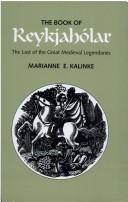| Listing 1 - 2 of 2 |
Sort by
|
Book
Year: 1996 Publisher: Toronto Buffalo London University of Toronto Press
Abstract | Keywords | Export | Availability | Bookmark
 Loading...
Loading...Choose an application
- Reference Manager
- EndNote
- RefWorks (Direct export to RefWorks)

ISBN: 0802008240 0802078141 9786611997359 1281997358 1442680563 9780802008244 9780802078148 Year: 1996 Publisher: Toronto, [Ontario] ; Buffalo, [New York] ; London, [England] : University of Toronto Press,
Abstract | Keywords | Export | Availability | Bookmark
 Loading...
Loading...Choose an application
- Reference Manager
- EndNote
- RefWorks (Direct export to RefWorks)
The Book of Reykjahólar, produced on the very eve of the Reformation, investigates what may be considered the last medieval legendary. The legendary's significance resides in its preserving in Icelandic translation a group of otherwise unattested medieval Low German saints' lives. Marianne E. Kalinke presents a literary analysis of the Reykjahólar legendary, demonstrating what kind of sources the translator used in his compilation and how he collected, combined, and adapted these texts to suit his Icelandic audience. The book also offers stylistic, thematic, and comparative analyses of the legends.A number of these Christian myths are apocryphal, some transmit folk tales and romances, such as the legend of the hairy anchorite (St John Chrysostom), the search for the highest king (St Christopher), the tale of the grateful lion (St Jerome), the tale of the dragon-slayer (St George), and the story of the holy sinner (Gregorius peccator). The legends belong to the vast corpus of German hagiography, yet the currency of these particular versions is documented today only in translation by virtue of their inclusion in this Icelandic legendary. The book opens with a survey of the development of German hagiography, goes on to a discussion of the religious and intellectual climate in early sixteenth-century Iceland, and then follows with a consideration of the legendary's Low German sources and its production by one of the wealthiest Icelanders of the time, Björn Thorleifsson of Reykjahólar.
Low German literature --- Old Norse literature --- Tales, Medieval --- Christian saints --- Christian hagiography --- History and criticism --- History --- Reykjahólabók --- Saints chrétiens --- Littérature bas-allemande --- Littérature vieux norroise --- Legends --- Légendes --- Histoire et critique --- Reykjahólabók --- History and criticism. --- Reykjahólabók. --- Book of Reykjahólar --- Low German literature - History and criticism --- Old Norse literature - History and criticism --- Tales, Medieval - History and criticism --- Christian saints - Legends - History and criticism --- Christian hagiography - History - To 1500
| Listing 1 - 2 of 2 |
Sort by
|

 Search
Search Feedback
Feedback About UniCat
About UniCat  Help
Help News
News